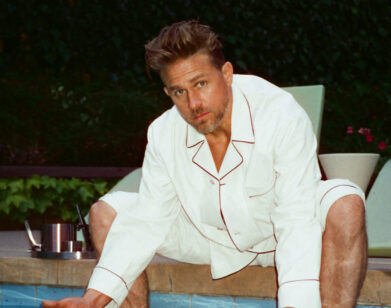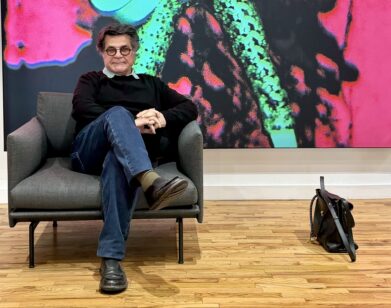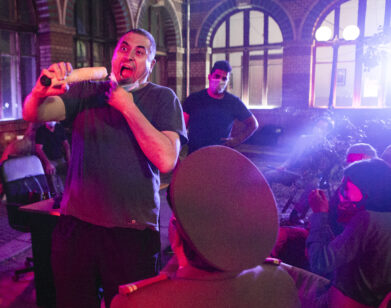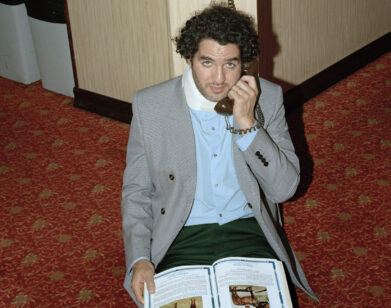Dustin Lance Black

It’s like if I told you, ‘You’re never going to be allowed to publicly and openly love anyone or have anyone publicly and openly love you.’ That leaves a hole in a person . . .Dustin Lance Black
In the hierarchy of Hollywood, screenwriters are often granted a position so low, given their creative value, that the prospect of one becoming a star overnight is almost laughable. But that’s just what happened to Dustin Lance Black. To most of the world, Black first appeared on the radar when he took to the stage last year to accept his Academy Award for best original screenplay, bestowed for his script for Gus Van Sant’s Milk. Black’s acceptance speech was an eloquent and moving one about individual rights that surprised many in the audience, given his youth and actorly-rather than writerly-good looks. But in truth, Black’s involvement in the making of Milk reached far beyond a biopic of slain politician and gay-rights activist Harvey Milk. He served as executive producer on the film and was basically a one-man army from the beginning-even before Van Sant had signed on at the helm-to ensure that Milk’s story did finally make it to the screen (other directors have tried unsuccessfully to make a Milk biopic over the years).
Black’s knack for creating moving scripts and his dogged determination to see a project through was evident even before his entrance into feature films. Raised a Mormon in San Antonio, Black was brought on as a staff writer for the HBO series Big Love, and by season three he had also become one of the show’s co-producers. Certainly the old studio notion of the screenwriter as the cinematic equivalent of a mechanic-necessary but ultimately interchangeable and possessing absolutely no power on set-is something that the 36-year-old Black has managed to turn on its head. He’s also managed to flip another old adage about the film industry: that talking politics is bad for your career. The content of Black’s Oscar speech was a call for equal rights for gays and lesbians, and he has been one of the rare voices from within the film industry to speak so passionately-and openly-about gay activism. After California voted to pass Proposition 8 in 2008, which added a provision to the state constitution to block gay marriage, Black helped form the American Foundation for Equal Rights (AFER), a nonprofit organization created to help support the plaintiffs in the lawsuit that eventually succeeded last August in overturning that decision.
When he’s not speaking for his cause, Black is working on a spate of new projects. He is penning another historic biopic, this time about infamous FBI director J. Edgar Hoover, which will be directed by Clint Eastwood and is rumored to star Leonardo DiCaprio. He’s also currently working on a screenplay adapted from a graphic novel and another one on the real-life misadventures of a young man running from the FBI. But this fall sees Black wearing an entirely new hat: He recently directed his first feature film, What’s Wrong with Virginia, a half-drama, half-comedy that stars Jennifer Connelly as a schizophrenic mother who is being looked after by her young son (played by new-comer Harrison Gilbertson), which premiered at the Toronto Film Festival in September. Oliver Stone, a filmmaker known for his own politicalism and interest in historical narratives, spoke with Black on August 4, only minutes after United States District Court Judge Vaughn R. Walker overturned Proposition 8. Black was already celebrating.
OLIVER STONE: I thought we might meet in person, but I guess you’re in New York.
DUSTIN LANCE BLACK: Actually I just landed in L.A., unexpectedly. My life exploded last night. We got news that this federal case that we filed against Prop 8 was going to be decided, so I jumped on a plane.
STONE: Okay. I hope this interview is being recorded and someone is on the line-or at least anyone else besides the FBI.
BLACK: You know the FBI is in on this call.
STONE: What is all that noise in the background?
BLACK: I’m at a press conference. I just stepped away from it. The federal judge just ruled in our favor and struck down Proposition 8 in California.
STONE: [David] Boies and [Theodore B.] Olson are the two lawyers.
BLACK: Right, and they won. They are part of a board we created almost two years ago called AFER with the idea that perhaps it was time to take this fight to the federal level and to make federal constitutional arguments. Not everyone was in favor of that idea. I got the most resistance from some members of the gay community, but we forged ahead and today is beautiful.
STONE: Who else created this board with you?
BLACK: Chad Griffin [Board President of AFER and founding partner of political and communications strategy firm Griffin/Schake] is the guy who really showed us the way. He found Olson. I was introduced to Chad because he had heard-I think through my agents and probably also through my Oscar speech-that I wanted to take the fight federal. I said those naughty words in my Oscar acceptance speech-full federal rights. So we were introduced, and I fell in love with him immediately. He’s incredibly smart and very aggressive. He, Rob Reiner, Bruce Cohen, Michele Singer Reiner, Kristina Schake, and myself are the founding board members for AFER.
STONE: So what is the next step on the legal circuit?
BLACK: The other side went very quickly to appeal the verdict on the first day. Right now we are in limbo-land. But I know inevitably it’s going to go to the Ninth Circuit, and it will be argued there. Eventually it’s going to be sitting in front of the U.S. Supreme Court.
STONE: What do you think will happen there?
BLACK: I think by having Ted Olson pleading the case and making such strong, passionate, cogent arguments obviously sends a signal that this isn’t a partisan issue. I think that started a wave through the conservative side saying, “It’s okay for you to come out as pro-gay on civil rights, pro-equality.” We’ve seen this happening with people like [John] McCain-or at least his wife and daughter-and with Laura Bush, who came out in favor of gay marriage. I think you’re going to see the numbers start to change even more and a momentum will start to build-one that the U.S. Supreme Court wants to see if they’re going to rule in your favor.
STONE: And when will that be?
BLACK: If I were a betting man, I would say a year and a half.
STONE: Are you planning on getting married?
BLACK: Yeah! Eventually . . . [Stone laughs] What do you think? What’s your advice on marriage?
STONE: I don’t know. It’s all individual. Do you have somebody in your life?
BLACK: Yeah, I do. But it’s sort of recent . . . You put me on the spot. Now I’ve got to buy a ring. But I’ll wait because I have another year and a half. We’ll see if the relationship lasts.
STONE: How old are you, if I may ask?
BLACK: I’m 36.
STONE: Oh, 36. Well, you’re not that young. And if you’re like Harvey Milk, you’re jumping around a lot.
BLACK: Do you remember meeting me on the set of Milk? We met briefly on the day you visited.
STONE: I was with Sean [Penn] and Josh [Brolin].
BLACK: Yeah, we talked for like half a second. I think you called me Opie-you know, after Ron Howard. I took it as a compliment. I think you said that because I must have been looking young that day.
STONE: I called you that? That’s bizarre. Sometimes I do that. It’s just a spur-of-the-moment feeling. I remember working on a Harvey Milk script a long time ago. He was a busy man. That was back
in the 1980s.
BLACK: Yeah, you worked on it with Gus [Van Sant], right? It was based on The Mayor of Castro Street [1982]. That’s such a good book. When I wrote Milk, I wasn’t allowed to touch that book. I had to go and do all of my own research. But, yes, Harvey was a very energetic guy. God knows he was switching careers every three years.
STONE: He’s a fantastic character. And I’m excited about your script for the film on J. Edgar Hoover. What are you going to do there?
BLACK: He’s the reason the FBI is listening in on this call, right? [laughs]
STONE: Are you going to have Hoover dressing-up in drag? Is there evidence that really happened?
BLACK: I’m going to let Clint [Eastwood] decide what he wants to do with the film, but the script is done. I didn’t find a lot of proof that Hoover cross-dressed. I think it was more a form of homophobia against him. Do I think J. Edgar Hoover was gay? Yes. Do I think he cross-dressed? No. I think that was just one of the ways people tried to bash him because they probably had the sense that he was gay. Did he ever put on a dress? Hell, I put on my mom’s undergarments when I was a kid. I didn’t find much credible evidence that Hoover went out socially dressed up in women’s clothes. But a script is 90 percent research about the person, and then so much about yourself ends up being in there, too. Anyone who says a movie about history is a historical document is crazy. It’s a document that incorporates who that person was and who I am now.
STONE: Milk was a hero to many people. What attracted you to Hoover?
BLACK: The attraction to Milk was pretty obvious. He’s a father figure. I thought it might be worth investigating the opposite of Milk-what a cautionary historical figure would be like. This is a tale of a closet case, as opposed to an inspirational tale of a man brave enough to come out. It’s almost the flip side. I’m always interested in getting to know people, and that means vilified people as much as those celebrated. You find out that heroes aren’t always so heroic, and villains have some bit of humanity in them. As much as I went into this project not really liking Hoover and feeling upset with so much of what he did and what civil rights he violated, there is a person there, a human being. If you don’t humanize him and try to show why he did the things he did, then you are left with this cardboard figure of Hoover-whether it’s one with the “G-Man” machine gun or in a dress. I wanted to figure out who the guy really was.
STONE: You do admit that he wrecked many lives during the blacklist days of the McCarthy era?
BLACK: He did heinous, heinous things-often in the name of trying to hold on to the country’s admiration. I do think he truly had a deep-seeded hatred of communism. I don’t think he was just using his power opportunistically. But clearly he went way too far with it. And there was a side to him that did know that it was helping him in the PR department. But listen, it’s like if I told you, “You’re never going to be allowed to publicly and openly love anyone or have anyone publicly and openly love you.” That leaves a hole in a person, and they might fill it with the country’s admiration. But that is a very ephemeral thing. It comes and goes. So you start to see a man trying to hold on to that, and it’s very desperate. It’s ugly to watch someone trying to hold on to something for too long.
STONE: If he’d survived into the 1990s and communism had died, what would he have done for an enemy?
BLACK: That’s the other thing about tackling him-you want to see how this subject is pertinent to today. When I was a kid watching your film JFK [1991], it was all about wanting to know what we don’t know. It all felt very current, even if Kennedy felt to me as a kid like lifetimes ago. To me it was speaking to what was going on right now. So I think we need to be very careful with some of the same issues today that were part of Hoover’s past-careful about the categorization of Islamic people, blanket categorization, and saying that they are all terrorists. Or that they shouldn’t have a mosque here. That’s very reminiscent of the Red Scare.
STONE: So now you’ve directed your first film-What’s Wrong with Virginia. How did it go?
BLACK: It was great. It was fucking freezing. We shot it out in Michigan because they offered us that tax credit-40 cents back on the dollar. You can’t say no. The story was supposed to be on the beach in Virginia, so I went out there and thought, How am I going to fake Michigan as a beach in Virginia? We shot by this lake in a tiny town, but by September the temperature was already in the 40s and it rained on us every single day. It was supposed to be a sunny summer beach-town movie, so that was a challenge.
STONE: What did you do?
BLACK: We used a lot of tarps. We still went with the idea of it being summer, but we did have to move some of the scenes inside that should have ideally been shot outside. Directing was liberating and intimidating. It’s something I’ve always wanted to do. I got a taste of being in the driver’s seat while I was writing for television, but it doesn’t compare to having written and directed a film, sitting behind that camera hoping you’re not fucking it up.
STONE: The film is somewhat autobiographical, isn’t it?
BLACK: It is autobiographical in terms of themes, although it isn’t based on any sort of history. It goes back to what I did with Big Love, which was a way to get rid of some of my demons. It had more to do with mother-son issues. I grew up in a family with a mother who has a disability, and much of that time it was just her, my two brothers, and me. It was kind of us raising each other. In other parts of the family there is a history of mental illness, so the film was about confronting that. I think sometimes when I tell these stories of having a paralyzed mother and no father and the kid almost helping to raise the mom, people find it very dark. But it isn’t at all for me. I had this really vibrant, rule-breaking childhood, and I treasure it. So I thought I’d like to make a movie about it: this mother and son who are trying to achieve the American dream. And also to poke at the American dream with a big stick and ask, is this really what we are after here? It’s a funny film. It isn’t incredibly serious, although it might sound like it is.
STONE: Did you get what you want? Sometimes first-time filmmakers don’t get all the way to where they want to get to. They back off or get intimidated by the difficulties. Did you get the emotional elements that you wanted to bring to the story?
BLACK: Oh, yeah, definitely. I think it definitely hit the core of what I was looking for. I think we actually went further than what I thought it was going to be because I had Jennifer Connelly, who’s really brave. I don’t think anyone has seen her like this. First of all, she plays a paranoid schizophrenic woman who is being raised by her child. I told her, “This is based on a family member of mine who was very vibrant, funny, and alive.” So she ran with that. And Ed Harris played along, too. But I learned a great lesson from Gus, which is that you go with the moment. I tried as best I could to leave my expectations at the door each morning and to try to forget what I was seeing when I was writing the script-to just show up on set and see what we had to do and what we could make of it. That helped. Otherwise I think I would have gotten mired down and lost in what I thought it could be.
STONE: Did you rehearse a lot?
BLACK: We did a lot of talking and discussing. Jen and I met a schizophrenia specialist out in California who really walked us through what it is like and what it looks like. We went to various doctors and met with actual patients. So it took a lot of research and a lot of playing together and getting really comfortable with each other. By the end we were familiar enough on set to say, “Hey, that’s great.” Or “No, that sucks.”
STONE: Is your mother still alive?
BLACK: I left my mother this morning, and she was very much alive then. She is paralyzed from when she had polio as a child. But the character that Jen plays is a combination of several people. My mom might see some part of our relationship in the film, but she isn’t schizophrenic. That part is based on someone else in the family-someone who’s passed away.
STONE: Are you living in New York these days?
BLACK: I’m living in between-some of the time in New York and most of the time in L.A. I try to live in New York, but every time I get there they call and say, “Hey, can you come back to pitch this or that idea?” I end up in hotel rooms or on friends’ couches in Los Angeles.
STONE: You’re still living on couches? You don’t even have a hotel room?
BLACK: They get me a hotel, but I get lonely. So I go stay on friends’ couches when I’m in L.A.
STONE: Maybe you should rent a house. You’re from Texas originally, right?
BLACK: Yeah, from San Antonio.
STONE: That’s where my ex-wife is from. I’ve been there many times. It’s dull. It’s one of the biggest cities in the United States, and it’s probably the most boring.
BLACK: I was like a Mormon Air Force brat in San Antonio. I didn’t really know much about the city, except that you can float on the river and eat tacos.
STONE: What’s your impression of the Alamo? What is your take on the historical versions that you hear?
BLACK: When you grow up in Texas, they make you take a class called Texas History. And you take it every single year. [Stone laughs] It’s like U.S. History, except it’s only about Texas-that’s what you’re going to learn. You feel like Texas is its own republic. The books portray Texas as great victors and they sort of cover up some of the messier events with Texas becoming “independent.” Around the time I discovered that I wasn’t going to be Mormon anymore, I also discovered I probably shouldn’t believe everything I’d learned about Texas.
Oliver Stone is an Academy Award–winning director. His latest film, Wall Street: Money Never Sleeps, is in theaters now.
Photos: Dustin Lance Black in Los Angeles, June 2010. Coat: Marc Jacobs. T-Shirt: Giorgio Armani. Pants: Diesel. Necklace & ring: Black’s own. Grooming Products: Osis, including Dust It mattifying powder. Fragrance: Armani Code by Giorgio Armani. Styling: Keegan Singh/Streeters. Grooming: Cori Bardo/www.themagnetagency.com. Special Thanks: Drawing Room, Los Angeles.






